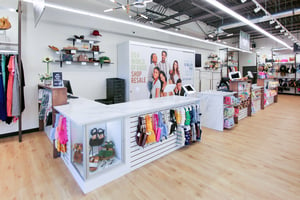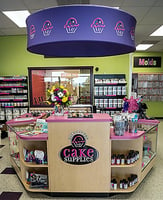Retail involves the intricate and dynamic process of showcasing products to potential customers, which in turn affects their shopping experience. Retail stores undergo changes in design as consumer preferences and the retail landscape shift. Custom millwork is a key feature of these trends that bring both aesthetic appeal and practical utility to retail stores. The future of retail spaces is being shaped by millwork, which seeks to create spaces that inspire and motivate customers.
Personalization and Brand Identity
In today's market, a strong brand identity and personalized shopping experience are essential to stand out. By utilizing custom millwork, retailers can incorporate various brand elements into their spaces, such as engaging shelving units and custom checkout counters. The level of customization not only elevates brand recognition but also fosters a more intimate and enjoyable shopping atmosphere.
Experiential Spaces
Retail is moving beyond simple transactions to offering immersive experiences. The implementation of millwork involves converting retail spaces into destinations where customers can interact with products in unique ways. Retailers are showcasing products through interactive display units, bespoke fitting rooms, or themed environments that convey a brand's story through craftsmanship and design. Through these experiential elements, customers are motivated to spend more time in the store, resulting into a stronger connection with the brand.
Flexibility and Adaptability
Spaces in the retail industry must be able to adjust to changing trends and product lines at any moment. Modular millwork solutions allow retailers to easily change their layouts, display designs, or store appearance. This adaptability not only keeps retail environments fresh and relevant, but also allows for efficient use of space during specific events or seasonal changes.
Sustainability in Design
Consumers are increasingly influenced by sustainability, and the design of retail stores is adapting to this trend. Millwork made from sustainable materials and processes is increasingly important. The store's sustainability profile is enhanced by incorporating eco-friendly materials such as reclaimed wood, environmentally friendly finishes, and efficient lighting.
Technology Integration
The convergence of digital and physical retail has made it crucial to incorporate technology into store design. Digital touchpoints can be integrated into the physical store environment through millwork, including built-in screens, interactive displays, charging stations, and tech-enabled fitting rooms. This combination of seamless technology adds convenience and value to the customer experience, making shopping more enjoyable.
Conclusion
Retail store design trends are a reflection of the industry's evolving towards more personalized, flexible and experience-based experiences. Custom millwork is a crucial aspect of this approach, as it allows retailers to create spaces that reflect both their branding and customer preferences. Despite the challenges, millwork in retail environments will continue to thrive and find creative ways to enhance store design and engage customers.





.png?width=203&height=142&name=IFA%20Member%20Logo%20EPS%20(1).png)
.png%20for%20web.png?width=203&height=94&name=2022_VetFran_Logo%20(002).png%20for%20web.png)
.png?width=203&height=150&name=ICSC-logo-tag-full-color%20(1).png)